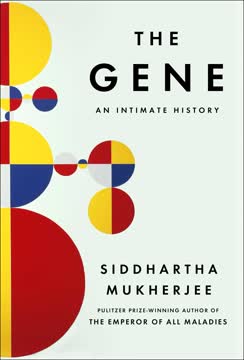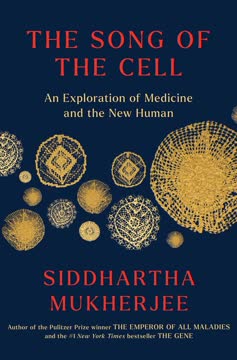Key Takeaways
1. Genetic knowledge empowers you to take control of your cancer risk
Knowing about a cancer mutation gives you power. It gives you options and lets you make decisions before cancer makes them for you.
Knowledge is power. Understanding your genetic predisposition to cancer allows you to take proactive steps to manage your risk. This information can guide your decisions about screening, preventive measures, and lifestyle choices. For example:
- Regular screenings can detect cancer at an early, more treatable stage
- Prophylactic surgeries can significantly reduce cancer risk in high-risk individuals
- Lifestyle modifications, such as diet and exercise, can help lower overall cancer risk
By being aware of your genetic risk, you can work with healthcare professionals to develop a personalized risk management plan. This proactive approach can lead to better health outcomes and peace of mind.
2. Family history is crucial for understanding inherited cancer risk
We all have them. We all have lots of them. The vast majority of mutations don't cause cancer. Most don't have any effect on your body at all. But some can lead to cancer.
Patterns reveal risk. A thorough family history is essential for identifying potential inherited cancer syndromes. Key patterns to look for include:
- Multiple family members with the same type of cancer
- Cancer diagnosed at an unusually young age
- Rare cancers or multiple primary cancers in one individual
Creating a detailed family pedigree can help you and your healthcare providers spot these patterns. It's important to gather information from both sides of your family, including:
- Types of cancer diagnosed
- Ages at diagnosis
- Other relevant health conditions
Remember that not all familial cancer is due to inherited mutations. Environmental factors and chance can also play a role. However, a strong family history warrants further investigation and potentially genetic testing.
3. Genetic counseling and testing provide valuable insights
People who carry mutant forms of either of these genes have a very high risk of developing breast and ovarian cancer; they also have a modestly increased risk for a variety of other cancers.
Professional guidance matters. Genetic counseling is a crucial step in understanding your cancer risk. A genetic counselor can:
- Interpret your family history
- Assess your risk for inherited cancer syndromes
- Recommend appropriate genetic tests
- Explain the implications of test results
Genetic testing can identify specific mutations associated with increased cancer risk. Common genes tested include:
- BRCA1 and BRCA2 for breast and ovarian cancer
- MLH1, MSH2, and other Lynch syndrome genes for colorectal cancer
- TP53 for Li-Fraumeni syndrome
Understanding your genetic status can guide prevention and screening strategies, inform treatment decisions if cancer develops, and provide valuable information for family members.
4. Overcome barriers to accessing your family's medical history
We do keep secrets about cancer, and it's incredibly common to run into other problems—vagueness, bad information, bad feelings, legal issues—that keep people from understanding their risk.
Communication is key. Gathering accurate family medical history can be challenging due to various barriers:
- Family secrets and stigma around cancer
- Lack of communication between family members
- Incomplete or inaccurate information
To overcome these obstacles:
- Approach family members with sensitivity and explain the importance of sharing health information
- Use tools like genograms to visualize family relationships and health patterns
- Consider reaching out to distant relatives or using official records when information is limited
For adopted individuals, special strategies may be needed, such as contacting adoption agencies or using DNA testing services to connect with biological relatives. Remember that any information you can gather, even if incomplete, can be valuable in assessing your risk.
5. Make informed decisions about risk management strategies
There are no black-and-white decisions when it comes to risk management. There will always be judgment calls.
Balance risks and benefits. When faced with increased cancer risk, there are several management strategies to consider:
-
Enhanced surveillance:
- More frequent screenings
- Use of advanced imaging techniques
-
Chemoprevention:
- Medications that can reduce cancer risk (e.g., tamoxifen for breast cancer)
-
Prophylactic surgery:
- Removal of at-risk tissues (e.g., mastectomy, oophorectomy)
-
Lifestyle modifications:
- Diet, exercise, and avoiding known carcinogens
The best approach depends on your individual risk level, personal preferences, and life circumstances. Work with your healthcare team to weigh the pros and cons of each option. Consider factors such as:
- Effectiveness in reducing cancer risk
- Potential side effects or long-term consequences
- Impact on quality of life
- Family planning considerations
Remember that decisions can be revisited and adjusted over time as new information becomes available or your circumstances change.
6. Targeted therapies offer new hope for cancer treatment
Targeted therapies are an attempt to address these shortcomings. By administering a drug that inhibits a specific protein that cancer cells need more than normal cells do, molecularly targeted therapies can kill the cancer cells without killing normal cells.
Precision medicine advances. Targeted therapies represent a significant advancement in cancer treatment. Unlike traditional chemotherapy, these drugs specifically target cancer cells while minimizing damage to healthy cells. Key types of targeted therapies include:
- Kinase inhibitors (e.g., imatinib for chronic myeloid leukemia)
- Monoclonal antibodies (e.g., trastuzumab for HER2-positive breast cancer)
- PARP inhibitors (e.g., olaparib for BRCA-mutated ovarian cancer)
- Immune checkpoint inhibitors (e.g., pembrolizumab for various cancers)
These therapies can be particularly effective for cancers with specific genetic mutations. However, it's important to note that:
- Not all cancers have identified targets for therapy
- Resistance to targeted therapies can develop over time
- Ongoing research is needed to develop new targets and overcome resistance mechanisms
Genetic testing of tumors can help identify which targeted therapies may be most effective for an individual patient, leading to more personalized treatment approaches.
7. Participate in research to advance cancer genetics understanding
We need more data points like the ones my family provided. We need more research groups to have the resources and support to launch studies of families, and more families who will share their data.
Be part of the solution. Participating in cancer genetics research can have far-reaching benefits:
- For individuals: Opportunity to access cutting-edge treatments and screenings
- For families: Potential to uncover important genetic information
- For society: Accelerating progress in cancer prevention and treatment
Ways to get involved include:
- Enrolling in clinical trials testing new therapies or prevention strategies
- Participating in genetic studies by providing DNA samples and health information
- Sharing de-identified medical data through secure databases
Ethical considerations in research participation:
- Privacy protections for genetic information
- Informed consent processes
- Potential for unexpected findings
By contributing to research, you can play a vital role in advancing our understanding of cancer genetics and improving outcomes for future generations. Discuss research opportunities with your healthcare providers or genetic counselor to find studies that may be appropriate for you or your family.
Last updated:
Review Summary
A Cancer in the Family receives high praise for its accessible explanation of cancer genetics and inherited cancer risk. Readers appreciate Dr. Ross's personal story and empathetic approach, which makes complex scientific concepts understandable. The book is lauded for its practical advice on genetic testing, family communication, and risk management. Many reviewers found it empowering and informative, recommending it to those with family histories of cancer. Some critiques mention occasional dragging pace and potential bias towards medical procedures.
Similar Books










Download PDF
Download EPUB
.epub digital book format is ideal for reading ebooks on phones, tablets, and e-readers.




